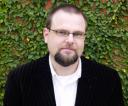
What’s the riskiest thing you ever did, and did it work out for you?
Easily the riskiest thing I ever did was quit my teaching job to be a full time writer. The decision was partially motivated by the birth of my daughter, Jo, and the decisions we were soon going to face over childcare. I had already been trying to write books for children when I quit—I was shopping one finished middle grade novel and writing a new YA novel—and we decided I should be a full-time writer and stay-at-home dad. It was certainly a risky decision. We had to sell one of our cars, cut back on treats like movies and eating out, and set an overall budget for ourselves to keep a handle on our expenses. Trying to find time to write was difficult at first too, but my wife’s flexible schedule allowed us to trade off Jo for large stretches, and during those off times I worked furiously at my writing. I never have sold those earlier two books, but the first book I wrote entirely as a full-time writer was Samurai Shortstop, which I sold. Five years later I’ve gone on to sell five more books and a couple of short stories, and I now thankfully have full days to write with Jo in Montessori pre-school. This year I’ll also make more money annually than I ever did working any of the full-time jobs I’ve ever had, so I think I can safely say it was a risk that has worked out in the long run.
What do you read in the bathroom?
Comic books. I used to have a stack of magazines in the bathroom, but I found that some issues would linger for months, and I wouldn’t work through them in a timely manner. My comics are monthly too, and it’s important to work through those before the next batch comes in, but I often want to pick up whatever novel it is I’m reading instead of a few comics when I have time to read. I still sit on the couch and read comics, but there are some I know I can pick up and take with me to the bathroom and knock off, as they say, in one sitting.
What’s the best piece of advice anyone ever gave you?
I attended an SCBWI conference one year in New York and heard Linda Sue Park give a luncheon talk that had me taking notes on my napkin. She explained how she wove stories together by making each chapter begin with an echo of something in the previous chapter, then introducing something new in that chapter that will be echoed in the next. It was a marvelously practical strategy that I put to use in the book I had just begun to work on—Samurai Shortstop—which became my first sale. She also said that she never includes something in historical fiction that she can’t use again, which was tremendous advice. When writing historical fiction you’re tempted to throw in everything from your research, but you have to fight that and put in only what is useful to your story.
What’s on your iPod?
This morning I’ve been listening to a band called Barleyjuice, which I guess I would best describe as a Celtic rock band. They’re a lot of fun, and really great musicians. They play Scottish and Irish festivals, and I first heard them play at this year’s Grandfather Mountain Highland Games. I went there to research Something Wicked, which is Macbeth reworked as a contemporary murder mystery set at a Scottish highland festival. One of my other favorite bands is They Might Be Giants, whom I name-check in Something Rotten, the first book in that series.
Do you outline or just let it flow?
I used to just let it flow, and I’d spend hours banging my head on the keyboard waiting for inspiration. Then I got the idea for Samurai Shortstop and realized I couldn’t keep all the research for a historical novel straight without some kind of game plan. I co-opted an outlining method I had used when doing some freelance work for the A&E series City Confidential, and it was as if the heavens parted and I was handed some sacred writing secret. By outlining every chapter in great detail before I ever wrote word one of Samurai Shortstop I was able to sit down in my office, turn to the next page in my notebook, and just go. Suddenly I was worried not about what I was writing, but how I was going to write it. That was a real breakthrough for me as a writer. Thinking about what happens and thinking about how you are going to write it are two very different processes, and it was a mistake for me to try both at the same time. Other people may be able to handle both at one time, but not me. Separating the two has effectively killed my writers block. I still sit around banging my head on the keyboard during the outlining phase trying to figure out what I want to have happen, but at least I don’t leave my office after three hours of that and beat myself up for not getting any pages of the book written. I know there are people out there who swear by the free-form liberty of just sitting and writing, but I’m not that kind of writer. Now that I’ve discovered the outline, I’ll never go back.
Thanks to you both! What a great interview with the amazing Alan Gratz! Alan, could you share more details about your outlining? What a great aha moment for you and how lovely of you to share it. As always, I’m looking forward to reading your next book. Kudos and congratz!